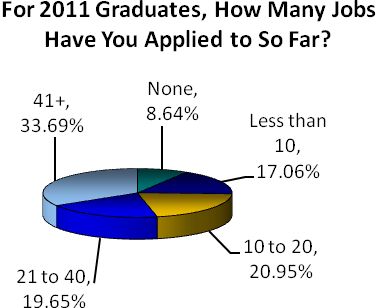College hiring is looking up, which is good news for this year’s graduating seniors who have had to endure three years of warnings about their future job prospects.
The National Association of Colleges and Employers last week reported that its survey of employer plans found them expecting to hire 19.3 percent more grads this year than last. That’s a significant improvement over their plans just seven months ago, when the prediction was for a 13.5 percent increase.
“This is the first time since 2007 that we’ve seen a double-digit increase in spring hiring projections,” says Marilyn Mackes, NACE executive director. “That’s a good indication that the job market for new college graduates is gaining momentum.”
Strongest college recruiting season since 2007
NACE also found employers are receiving fewer applications for each opening than they did a year ago, when they averaged 40.5. Now, they are getting 21 per opening.
That’s not because students are sending out fewer resumes. NACE found the total number of applications companies receive from seniors is up 45 percent over 2010.
 According to a survey by Beyond.com conducted between February and March, a third of all seniors had already sent out more than 41 applications in pursuit of a job. Over half the seniors had sent out more than 20 applications.
According to a survey by Beyond.com conducted between February and March, a third of all seniors had already sent out more than 41 applications in pursuit of a job. Over half the seniors had sent out more than 20 applications.
Global outplacement consultancy Challenger, Gray & Christmas says its own analysis shows the spring 2011 college recruiting season will be the strongest since 2007.
“Entry-level hiring has not returned to pre-recession levels, but this year’s graduates should find markedly improved job-search conditions. Colleges and universities around the country are reporting increased on-campus recruiting and surveys of employers indicate more graduate hiring, as companies rebuild their bench-strength after massive layoffs during the downturn,” says CEO John A. Challenger.
Recruiter visits also increasing
The consultancy pointed to data from the U.S. Bureau of Labor Statistics showing the 20-24 age group saw the largest employment increase over the first three months of 2011. Employment among 25- to 34-year-olds and 35- to 44-year-olds each grew by less than one percent, and employment among 45- to 54-year-olds fell by 1.1 percent.
Campuses across the country are also reporting increased visits from recruiters, according to the Challenger analysis, citing reports from the University of Michigan, Texas Christian University, and the University of California, Berkeley, which returned its annual job fair to a two-day event.
Even with the improvement in college hiring, Challenger warns that finding that first job won’t be easy. Hiring improvement is not uniform across all disciplines. A broad, 4,600-company survey conducted at the beginning of the school year by The Collegiate Employment Research Institute predicted a 10 percent overall hiring pickup for students graduating with a bachelor’s, driven by large employers and small firms and fast growth companies.
The report predicted MBAs will struggle, as the Institute saw little growth there. The hottest opportunities will be for top students in accounting, computer science, e-commerce, marketing, math, public relations, economics, entrepreneurism, and even liberal arts.
Challenger, Gray & Christmas also points out that besides competing against each other, seniors are also facing competition from last year’s grads and even those from two and three years ago, who may have had to take jobs outside their field.
